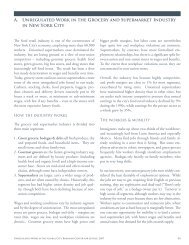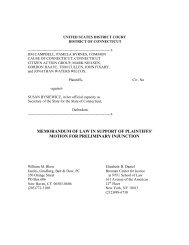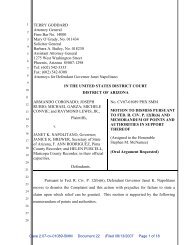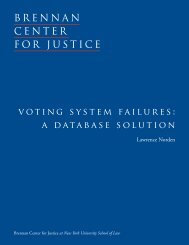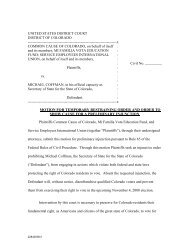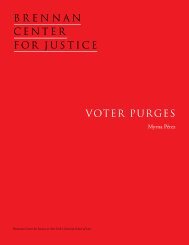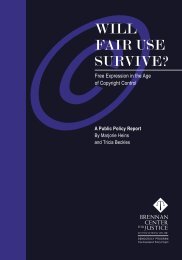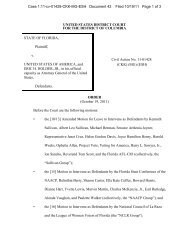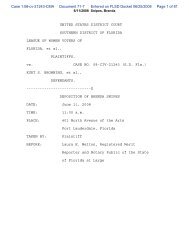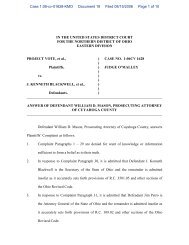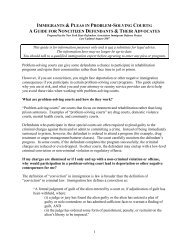Motion to Dismiss Case - Brennan Center for Justice
Motion to Dismiss Case - Brennan Center for Justice
Motion to Dismiss Case - Brennan Center for Justice
You also want an ePaper? Increase the reach of your titles
YUMPU automatically turns print PDFs into web optimized ePapers that Google loves.
<strong>Case</strong> 2:07-cv-01089-SMM Document 48 Filed 01/22/08 Page 8 of 15<br />
1<br />
2<br />
3<br />
4<br />
5<br />
6<br />
7<br />
8<br />
9<br />
10<br />
11<br />
12<br />
13<br />
14<br />
15<br />
16<br />
17<br />
18<br />
19<br />
20<br />
21<br />
22<br />
23<br />
24<br />
25<br />
26<br />
27<br />
28<br />
As discussed above, a state may disenfranchise felons without running afoul of the<br />
Constitution. U.S. Const. amend. XIV, § 2; Richardson, 418 U.S. at 54. Having<br />
disenfranchised felons, a state may refuse <strong>to</strong> re-enfranchise felons entirely, or permit<br />
felons <strong>to</strong> regain the franchise only after completing their sentences. Accordingly,<br />
“[r]es<strong>to</strong>ration of civil rights is a creature of statute.” State v. Buonafede, 814 P.2d 1381,<br />
1383 (Ariz. 1991). In this case, the fines or restitution are part of Plaintiffs’ sentences.<br />
A.R.S. § 13-801(A); (Compl. 17.). Plaintiffs do not allege that the fines or restitution<br />
should be not be part of their sentences, nor do they allege that these obligations have<br />
been paid in full. (Cf. Compl. 23, 29, 33.) There<strong>for</strong>e Defendants correctly assert that<br />
Plaintiffs have no right <strong>to</strong> vote <strong>for</strong> the Arizona statutes <strong>to</strong> abridge.<br />
The question remains whether Plaintiffs state a claim on the grounds that the fines<br />
and restitution requirement denies them the right <strong>to</strong> vote “<strong>for</strong> reason of failure <strong>to</strong> pay a<br />
poll tax or any other tax.” U.S. Const. amend. XXIV. That inquiry turns on whether the<br />
fines and restitution requirement constitutes a “tax,” as Plaintiffs allege that their civil<br />
rights would otherwise be au<strong>to</strong>matically res<strong>to</strong>red under A.R.S. § 13-912.<br />
“Poll tax” is defined as “a fixed tax levied on each person within a jurisdiction.<br />
Black’s Law Dictionary 1498 (8th ed. 2004). “Poll taxes are laid upon persons . . . <strong>to</strong><br />
raise money <strong>for</strong> the support of government or some more specific end.” Breedlove v.<br />
Suttles, 302 U.S. 277, 281 (1937), overruled on other grounds by Harper v. Virginia State<br />
Board of Elections, 383 U.S. 663 (1966). Although a state may not make “the affluence<br />
of the voter or payment of any fee an elec<strong>to</strong>ral standard,” states do have “the power <strong>to</strong> fix<br />
qualifications.” Harper, 383 U.S. at 666, 668. States may permissibly fix as a<br />
qualification <strong>for</strong> voting the requirement that a persons not have been convicted of a<br />
felony. Richardson, 418 U.S. at 56. It follows that, having decided <strong>to</strong> re-enfranchise exfelons,<br />
Arizona may permissibly fix as a qualification the requirement that those<br />
individuals complete the terms of their sentences. See A.R.S. § 13-912. The Arizona<br />
laws do not make ability <strong>to</strong> pay “an elec<strong>to</strong>ral standard,” but limit re-enfranchisement <strong>to</strong><br />
- 8 -



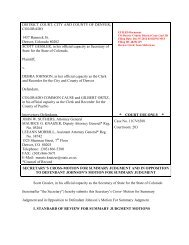
![Download the Letter [PDF] - Brennan Center for Justice](https://img.yumpu.com/50139248/1/190x245/download-the-letter-pdf-brennan-center-for-justice.jpg?quality=85)
